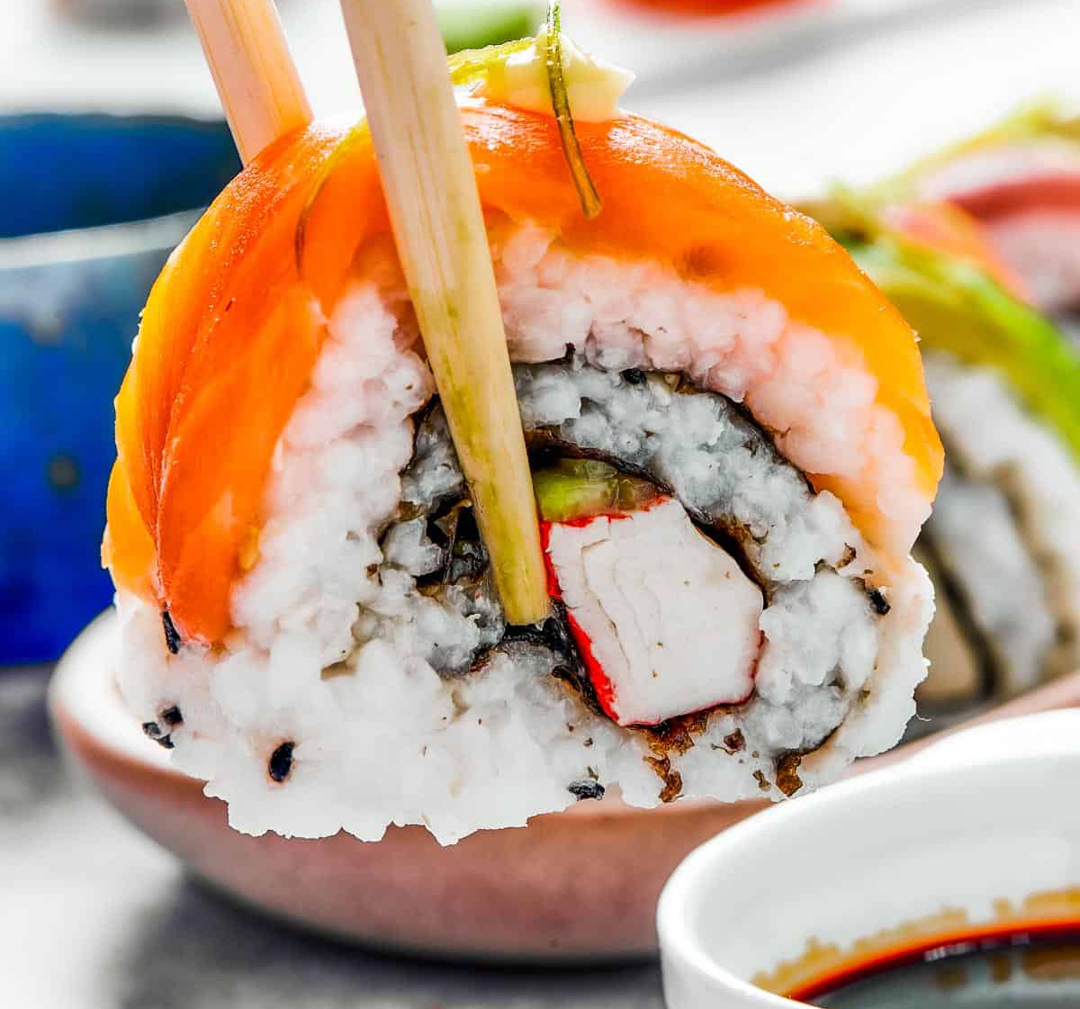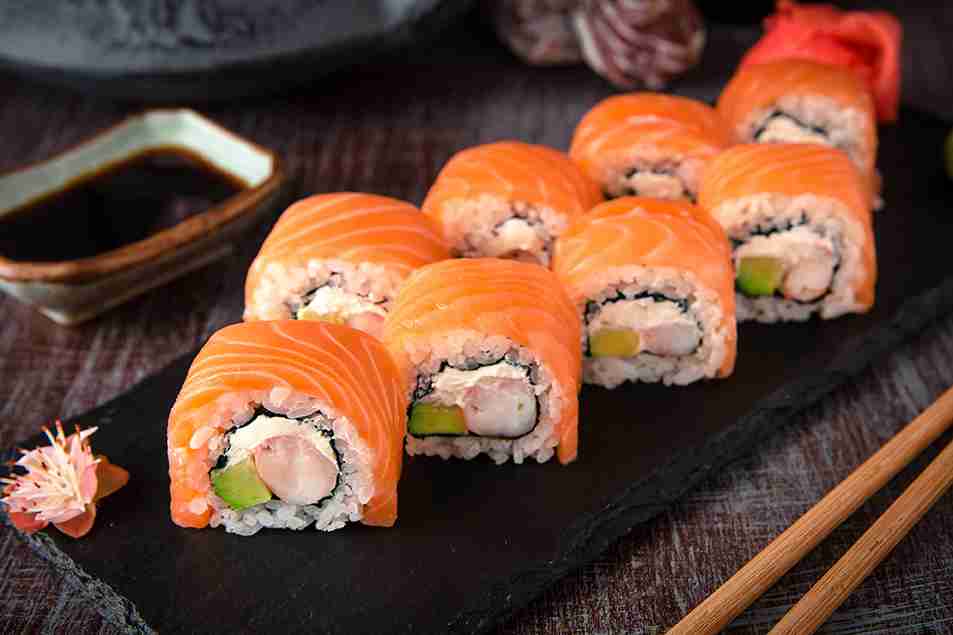[ad_1]

Sushi is a Japanese food consisting of cooked vinegared rice combined with other ingredients, seafood, vegetables and sometimes tropical fruits. Ingredients and forms of sushi presentation vary widely, but the ingredient which all sushi have in common is rice (also referred to as shari or sumeshi).
Sushi can be prepared with either brown or white rice. Sushi is often prepared with raw seafood, but some common varieties of sushi use cooked ingredients or are vegetarian.
Raw fish (or occasionally other meat) sliced and served without rice is called “sashimi”. Sushi is often served with gari (ginger), wasabi, and soy sauce. Popular garnishes are often made using daikon.
Some of the health benefits of sushi include its ability to lower blood pressure, decrease levels of bad cholesterol in the body, improve hormone balance, increase the metabolism, prevent certain cancers, aid in the health of your gastrointestinal system, boost circulation, build strong bones, and improve the strength of your immune system.
No matter where you are in the world, or what your personal preferences are for food, there is a good chance that you have eaten, seen, or been intrigued by sushi. This staple of Japanese cuisine has been around for nearly 700 years, although what we think of as sushi in the modern world only came around approximately 200 years ago. When discussing sushi, particularly its health benefits, it is important to remember that sushi comes in endless varieties, so the health benefits will similarly shift depending on what roles you choose.
Primarily, however, sushi will always contain rice, and will almost always be soaked in rice vinegar, which makes the rice stick together. Beyond that, the most common elements are raw fish (sardines, mackerel, salmon, and tuna are the most common in Japanese sushi), but there are also cooked elements in some other sushi varieties. Various vegetables, both pickled and unpickled, often accompany the fish and the rice roll (known as maki) will then be wrapped in seaweed (nori).
These basic elements change dramatically, depending on the region of the world, the modernity of the sushi restaurant/chef, and personal preference. The most common side dishes for sushi, ginger, wasabi, soy sauce, and green tea, also add their own unique health benefits to this internationally beloved dish.
The western world has been in a recent love affair with sushi, particularly since the recent health crazy after omega-3s, fatty acids that are actually beneficial and essential for human health. Omega-3s are found in very high quantities in certain types of fish, including many of the most common and delicious varieties included in traditional sushi. That being said, sushi doesn’t have to contain fish at all. many vegetarian rolls can be wonderfully healthy options, and other seafood like shrimp, eel, and scallops are also popular choices. Finally, depending on certain spicy sauces (made of mayonnaise) and tempura rolls may be delicious, but they also contain high levels of calories and fats. If you want the purest and healthiest form of sushi, stick with the traditional favorites, and always eat in moderation!

Nutritional Value of Sushi
Since sushi is a dish rather than a single ingredient, it is important to consider all of the parts when talking about nutrition. Nori (the seaweed wrapper) is very high in iodine, while ginger and wasabi contain various antioxidant compounds, as well as vitamins and minerals. The main part of the sushi, seafood, contains high levels of omega-3s, as well as selenium. Different types of fish contain different vitamins and minerals as well. Soy sauce may be a delicious dip for your sushi roll, but it contains very high levels of sodium.
Health Benefits of Sushi
Heart Health: Perhaps the most sought after benefit of sushi for most people is the easy and tasty access to concentrated forms of omega-3 fatty acids. This good form of cholesterol helps to balance out and even eliminate bad cholesterol in the body, helping to prevent clogged arteries and a bevy of related health concerns, including atherosclerosis, heart attacks, and strokes. Furthermore, omega-3 has been directly linked to lowering blood pressure, which increases oxygenation to important organ systems and tissues, thereby increasing the bodys metabolism. In terms of the best types of sushi for omega-3, lake trout, herring, tuna, and salmon are particularly high in this valuable fatty acid.
Hormone Regulation: Although people often eat sushi for the fish, it’s important to remember that there are other components in sushi, including the seaweed wrap that comes around the majority of sushi varieties. In Japanese, it is called nori, and is very high in iodine, which is an essential, but often overlooked, element of our health. Iodine is vital for the regulation and control of our endocrine system, most notably our thyroid gland. With proper levels of iodine in your system (but not too much!), you can ensure that your hormones are properly balanced in your body, thereby optimizing many of your most important reactions and metabolic activities.
Metabolic Boost: Fish is a high-quality protein that is low in calories and fat. Protein, especially healthy forms like fish, can significantly boost our bodys ability to function regularly, create new cells, metabolize energy efficiently, and keep us strong and healthy. Although many vegetarians choose not to eat meat, sushi is a favorite amongst pescatarians, since it provides a much-needed protein, rather than traditional vegetarian dishes.
Cancer Prevention: As mentioned above, sushi is about more than fish. The common elements of wasabi and ginger both have anti-carcinogenic and anti-mutagenic properties due to antioxidant compounds. These antioxidants help to neutralize free radicals before they can cause healthy cells to mutate into cancer cells. Furthermore, many varieties of fish are rich in selenium, a trace mineral that shows serious anti-cancer properties in many research studies. Nori, the seaweed wrapper, also has various phytonutrients that act as antioxidants, making sushi a great choice to boost your cancer defenses!
Digestive and Gastrointestinal Health: Green tea is always an option at any sushi restaurant worth its wasab, and the tannins in green tea have been closely linked to improved digestion and the health of your colon. Furthermore, although soy sauce is very high in sodium (which is bad news for people with high blood pressure), it contains high levels of iron and protein, along with protecting your colon from dangerous bacteria that can sometimes get into your food.

Immune System: There are a few elements of sushi that can boost your immune system, primarily the antibacterial properties of wasabi, which can come in particularly handy when eating raw fish, as there can occasionally be issues with freshness and bacteria, depending on where and when you are eating your sushi rolls. Ginger also acts as an antibacterial and antiviral agent, so make sure to add your condiments before popping your next California roll!
Circulation: The high levels of iron found in fish and soy sauce mean that your red blood cell count can get a boost from this Japanese delicacy. Iron is an integral part in the production of RBCs, which increases the circulation to all parts of the body, stimulates hair growth, improves the tone and color of your skin, improves the metabolism, and speeds the healing process of tissues and cells.
Low in calories: No, this doesn’t apply to all the sushi options out there, but many rolls contain very few calories, which makes them an ideal addition to your diet if you want to lose weight or control your current #weight. Opt for rolls that are heavy on vegetables, such as carrots, cucumber and #avocado and go easy on rolls that contain mayonnaise, cream cheese or other creamy fillings. Fish is also relatively low in #calories, so rolls that have salmon, tuna or shrimp are other good choices. When it comes to the health #benefits of sushi, low calorie counts are a prime factor to consider.
It contains Protein: Protein is vital for healthy muscle function and it also aids in muscle recovery after #exercise. Protein is abundant in meat, including fish, which means your average sushi roll is going to contain a good amount. Stay away from rolls with crunchy fish or shrimp because they are often fried, which isn’t all that healthy. Instead, go for lean fillings, such as shrimp and tuna. You’ll get some protein, without a huge dose of fat.
It offers up antioxidants: When you choose sushi rolls made with vegetables, you’re doing something great for your health. Most contain antioxidants, which counteract free radical damage and keep you looking and feeling young and healthy. Not only that, but antioxidants can help ward off many scary health issues, including cancer and heart disease.

It contains Trace Minerals: You don’t need mega doses of them, but trace minerals play a role in your overall health. Luckily for you, the seaweed in sushi saves the day. It contains concentrated amounts of many minerals, including copper, magnesium and iodine.
It gives energy: Yes, you #read that right! If you suffer from mid-afternoon slump, put down the chocolate bar and grab a couple of sushi rolls instead. The rice contains carbohydrates, which is your body’s main source of fuel. Opt for brown rice, which helps reduce the risk of a sugar crash later because it’s less refined than white rice. Any vegetables in the sushi also offer up carbohydrates
Warning about Sushi: Despite the delicious nature of sushi, don’t be tricked into thinking that you are only consuming a small amount of calories and gorge yourself on these bite-sized pieces. The average piece of sushi has 200 calories, but once you begin adding sauces, mayonnaise-based toppings, or tempura coverings, you are boosting the fat and calorie content to almost 500 calories per piece. In other words, choose your rolls carefully and always eat sushi in moderation. Furthermore, be aware of what types of fish you eat, as some people are allergic to specific varieties. Lastly, fish can have high levels of mercury, so it is always best to get sushi from a trusted restaurant who sources their fish carefully, and don’t have sushi every night, as a system that is unused to high levels of mercury or other unique trace minerals can have severe reactions.
Disclaimer
The Content is not intended to be a substitute for professional medical advice, diagnosis, or treatment. Always seek the advice of your physician or other qualified health provider with any questions you may have regarding a medical condition.
[ad_2]
Source link

Hi! I’m a dedicated health blogger sharing valuable insights, natural remedies, and the latest scientific breakthroughs to help readers lead healthier lives. With a holistic approach to wellness, I empower individuals with accessible and actionable content, debunking myths and offering practical tips for incorporating healthy habits.